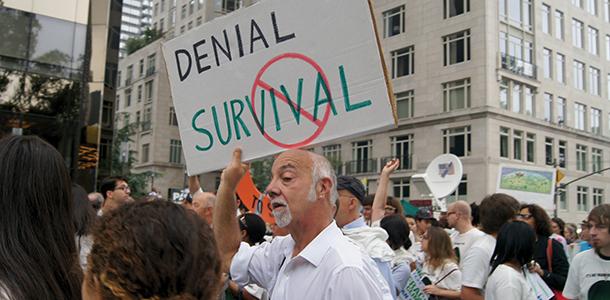Address climate change now, or we all pay later
Veronica Zambrano-Coffie/Guilfordian
A man holds a sign at the People’s Climate March last year. A group of Guilford students will attend this year’s march in Washington, D.C. on November 29.
Climate change. Global warming. The end of the world. A major transformation has already begun and it’s not going to end without a revolution.
“I think it’s the greatest threat that we have,” said William Mackin, visiting assistant professor of biology. “Because of climate change, it’s like we have thousands of Hiroshima-sized atomic bombs going off every day.”
According to a 2013 study, only 3 percent of voters, aged 18 to 34, do not believe in climate change. It is easy to see why. We get it crammed into our brains during science class, we hear about it on the news and we see the effects of it in movies like “Mad Max: Fury Road.”
But with so much attention, why has so little happened to address the topic?
For starters, people simply do not care enough. Unlike issues close to home, the effects of global warming are hard to notice. In Greensboro, one does not see the ice melting in Antarctica, the Minnesota moose population being decimated or the worldwide temperature increasing.
The matter of climate change is simply overshadowed by higher-priority issues.
As a result, politicians who prioritize other issues over global warming are elected to office and make policies that further harm the environment.
While we can’t see the worst effects of climate change right now, I do not want to experience the day when we can. This type of ignorance needs to stop before we create irreversible damage to the planet.
The Civil War occurred because elected politicians ignored the issue of slavery. There will be an even worse outcome if today’s politicians ignore the issue of global warming.
More importantly, climate change cannot be stopped unless countries come into agreement about carbon emission policies. There have been 20 U.N. conferences on the issue but only one major accord — the Kyoto Protocol. And even that was not ratified by one major polluter, the United States.
Transformation in climate change policy will occur at this year’s conference or next year’s conference only through public pressure. If enough people from all around the world show interest in ending climate change, agreements will surely be made.
“The most important tool in any campaign is awareness,” said Early College junior Varun Nair. “I think the number one priority is to let people know that climate change really is a big problem.”
But I don’t see that happening in the near future.
Last year, New York City hosted the largest climate march in history. However, the participation of 300,000 protesters was not enough to convince the U.N. representatives at the conference to make big changes. In fact, the meeting had so little impact that it didn’t even receive a fully translated Wikipedia page.
To truly revolutionize the world, more people need to come together and force governments to enact policies, such as carbon taxes incentivize businesses and residences to produce fewer emissions.
I predict that such a movement will happen too late. Based on chemistry, pressure will increase when temperature increases. People will only start to care when they experience climate change for themselves.
“I think governments will step in and look for ways to stop hurting the environment only when things have gotten bad enough,” said first-year Fawad Walizai.
If we want to save the world before it’s too late, activism for these changes need to begin immediately and on a large scale. The People’s Climate March, for example, is scheduled for Nov. 29 in Washington, D.C., and Guilford is sending a team to help support it. The main course, a demonstration in Paris, is set to occur at the same time.
“(One of our goals) is lobbying people in D.C.,” said senior Eva Cosgrove. “Lobbying in D.C. is much more pertinent than lobbying Greensboro legislation and council members.”
We need to stop throwing snowballs in the Senate chamber and listen to the calls of the people to stop a global catastrophe worse than nuclear Armageddon.











